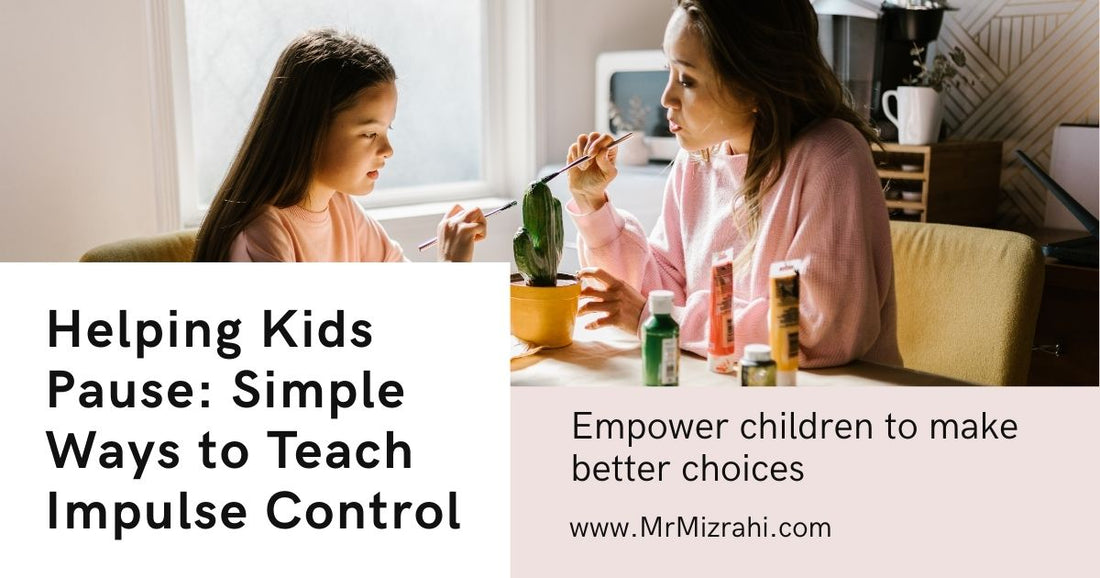
Helping Kids Pause: Simple Ways to Teach Impulse Control
Share
If you're raising young kids, you’ve probably seen it—your child blurting out in the middle of your sentence, running into a room without checking who’s around, or grabbing something before asking. It’s not bad behavior. It’s just part of being a child.
Children are naturally impulsive. They’re still learning how to navigate the world, and sometimes, that means acting first and thinking later. That doesn’t make them “bad”—it makes them normal. But as they grow, helping them develop impulse control becomes one of the most important life skills we can teach them.
Impulse control isn’t something kids either have or don’t have—it’s something they learn over time. It’s part of their executive function skills, which include planning, focusing, and remembering instructions. So, let’s talk about some real, doable ways to help your child develop this ability in a positive and encouraging way.
1. Model the Behavior You Want to See
One of the best ways to teach impulse control? Show it yourself.
Kids are always watching. If we want them to learn patience, self-control, or the ability to pause and think, we have to live that out ourselves. Something I’ve found helpful is talking through my thought process aloud. For example:
"I really want to check my phone right now, but I promised to finish folding the laundry first. I’ll do this first, and then I’ll take a break."
By hearing us narrate our own self-control in daily life, kids begin to understand how to manage their own impulses, too.
2. Make Waiting Fun: Teach Delayed Gratification
One trick I’ve used at home is a reward system that’s simple but effective. We give tokens (you can use coins, stickers, or even little colored blocks) when our child shows good behavior. Later, they can trade those in for something they love—maybe one-on-one time with a parent, a board game night, or a trip to their favorite park.
Even better? Let them save tokens for something bigger. This teaches that waiting and patience can lead to even better rewards. You’re not just building behavior—you’re teaching life lessons.
3. Name the Feeling to Tame the Feeling
When kids act out, it’s often because they don’t know what they’re feeling—or how to express it. Helping them identify and label their emotions gives them a sense of control.
At home, we talk about feelings a lot. I’ll say things like:
"It looks like you’re frustrated that your block tower fell. That’s okay to feel! Let’s figure out what we can do next."
We also talk about the difference between feelings and behavior. Feeling angry is okay. Hitting someone because you're angry is not. Having these conversations regularly helps kids understand themselves better—and act more thoughtfully over time.
4. Repeat, Repeat, Repeat (And Then Repeat Again)
Let’s be honest, how many times do we say the same instructions before they stick? A hundred? A thousand?
When I give directions to my kids, I now ask them to repeat it back to me before they start. Not only does it help them remember, but it also gives them a moment to pause and process before acting.
That simple habit makes a big difference—and when they get it right, I make sure to celebrate it. A little praise goes a long way.
5. Practice with Play
Games are an underrated tool for building self-control. Try playing classics like Simon Says or Red Light, Green Light. These games are actually mini lessons in stopping, listening, and thinking before acting. Best part? Your child won’t even realize they’re learning—they’re just having fun.
We also love partner reading time, where we take turns reading pages or paragraphs. It teaches patience and helps build those “wait-your-turn” muscles.
6. Stick to Routines
Predictability is a lifesaver. Kids thrive when they know what to expect, and routines help reduce the chances of impulsive behavior.
A simple example from our day: Every time we get to a street, we pause and say together, “Hold hands. Look both ways.” It’s just a routine now, and I know one day they’ll do it even when I’m not around.
7. Progress Over Perfection
This part is important: impulse control isn’t something that clicks overnight. Some days will be great. Some days won’t. But every opportunity is a learning moment.
When your child messes up (and they will—just like we do), remind them that it’s okay. Praise the effort. Teach the lesson. And keep moving forward.
We're not raising perfect children—we’re raising humans who grow, make mistakes, and learn along the way. And with enough love, support, and guidance, they’ll get there.
More articles on EXECUTIVE FUNCTIONS COACHING – Benjamin Mizrahi
